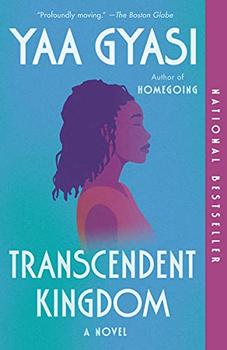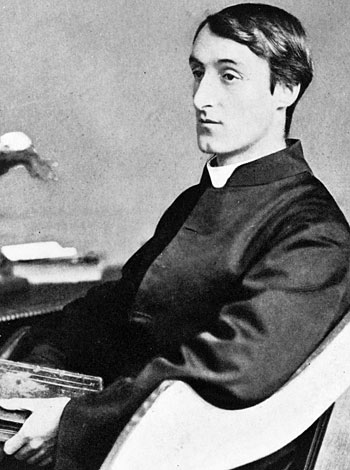Summary | Excerpt | Reading Guide | Reviews | Beyond the Book | Read-Alikes | Genres & Themes | Author Bio

Critics' Opinion:
Readers' Opinion:
First Published:
Sep 2020, 288 pages
Paperback:
Jul 2021, 304 pages
 Book Reviewed by:
Book Reviewed by:
Elisabeth Cook
Buy This Book
This article relates to Transcendent Kingdom
 In Yaa Gyasi's Transcendent Kingdom, Gifty, a PhD student of neuroscience, recalls a college course she took to fulfill a humanities requirement that focused on the poetry of Gerard Manley Hopkins. While Gifty didn't care for Hopkins' poetry, she felt a "strange sense of kinship" with the man himself when she reflected on the struggles he had in squaring his religious devotion with his sexual desires. Hopkins, a now-famous Victorian-era poet who converted to Roman Catholicism and became a priest, failed to achieve recognition during his lifetime, partly due to his unusual poetic style. Today, some writers and scholars consider his poetry to be informed by a repressed homosexuality that was at odds with his religious life.
In Yaa Gyasi's Transcendent Kingdom, Gifty, a PhD student of neuroscience, recalls a college course she took to fulfill a humanities requirement that focused on the poetry of Gerard Manley Hopkins. While Gifty didn't care for Hopkins' poetry, she felt a "strange sense of kinship" with the man himself when she reflected on the struggles he had in squaring his religious devotion with his sexual desires. Hopkins, a now-famous Victorian-era poet who converted to Roman Catholicism and became a priest, failed to achieve recognition during his lifetime, partly due to his unusual poetic style. Today, some writers and scholars consider his poetry to be informed by a repressed homosexuality that was at odds with his religious life.
Hopkins was born on July 28, 1844 in Essex, England, where he grew up in a well-to-do family with artistic inclinations and was raised in the Anglican Church. He took an early interest in visual art and poetry, and went on to study classics at Balliol College, Oxford. After reading about John Henry Newman's conversion to Catholicism in his book Apologia pro via sua, Hopkins joined the Roman Catholic Church. In 1867, he began training to become a Jesuit priest and burned all of the poems he had written to date, considering them to be in conflict with his chosen pursuit.
Hopkins began to write poetry again in 1875, two years before he was finally ordained, when he found himself deeply affected by the wreck of a German ship called the Deutschland and resolved to create a poem about it. With "The Wreck of the Deutschland," he introduced "sprung rhythm," a flexible poetic form that employed elements of both metered rhyme and free verse. He attempted to have the poem published in a Jesuit magazine that rejected it at least in part due to its unconventional rhythm. In his subsequent work, Hopkins continued to modify traditional poetic structures.
While due to his commitment to the priesthood Hopkins likely never had a romantic relationship with anyone, his journals reveal an attraction to men, perhaps most notably Digby Mackworth Dolben, a poet Hopkins met while studying at Oxford and a cousin of Poet Laureate Robert Bridges (a friend of Hopkins'). In his biography of Hopkins, Robert Bernard Martin writes that he "was completely taken with Dolben, who was nearly four years his junior, and his private journal for confessions the following year proves how absorbed he was in imperfectly suppressed erotic thoughts."
Hopkins' spiritual devotion was often a subject for his poetry, and some see the religious intensity of his work as an alternative means of expressing his sexuality. In A History of Gay Literature, Gregory Woods asserts that his "technical innovations are the key to the actual expression of an eroticism which, for all his struggles against the temptations of voyeurism and masturbation, he could not conceive of suppressing altogether."
In Transcendent Kingdom, Gifty's professor declares that "Hopkins is all about a delight in language." She proceeds to quote from the poem "Duns Scotus's Oxford," noting the pleasure the poet takes in the way hyphenated phrases such as "Cuckoo-echoing," "bell-swarmed" and "lark-charmed" fit together. Gifty observes that the woman looks "ecstatic and pained as she said this, like she was halfway to orgasm." While this passage paints a comical picture of an educator's enthusiasm for her subject, it also calls attention to certain elements of Hopkins' reputation, and how his poetry has been analyzed heavily, perhaps sometimes reductively, for links to his private life and repressed eroticism. While Gifty dislikes Hopkins' poetry, she takes a respectful, holistic view of him as a person, considering his sexuality and his religious devotion seriously.
Hopkins died of typhoid fever in 1889 without having published any of his work, but Robert Bridges later edited a volume of his poetry that appeared in 1918. Hopkins' work has influenced many other poets, including W.H. Auden, Dylan Thomas, Elizabeth Bishop and John Berryman.
Gerard Manley Hopkins
Filed under Books and Authors
![]() This "beyond the book article" relates to Transcendent Kingdom. It originally ran in September 2020 and has been updated for the
July 2021 paperback edition.
Go to magazine.
This "beyond the book article" relates to Transcendent Kingdom. It originally ran in September 2020 and has been updated for the
July 2021 paperback edition.
Go to magazine.





The Flower Sisters
by Michelle Collins Anderson
From the new Fannie Flagg of the Ozarks, a richly-woven story of family, forgiveness, and reinvention.

The House on Biscayne Bay
by Chanel Cleeton
As death stalks a gothic mansion in Miami, the lives of two women intertwine as the past and present collide.

The Funeral Cryer by Wenyan Lu
Debut novelist Wenyan Lu brings us this witty yet profound story about one woman's midlife reawakening in contemporary rural China.
Your guide toexceptional books
BookBrowse seeks out and recommends the best in contemporary fiction and nonfiction—books that not only engage and entertain but also deepen our understanding of ourselves and the world around us.